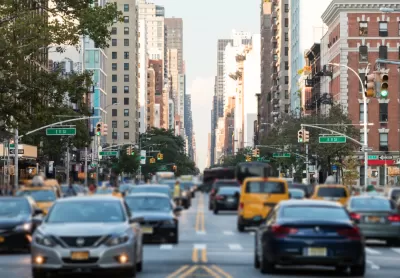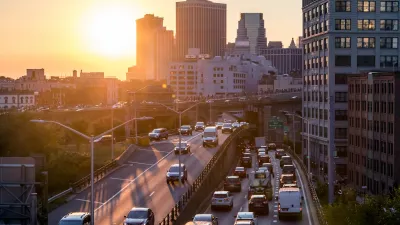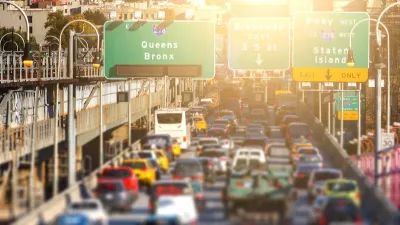Despite the administration’s stated concern for the “working class,” 85 percent of Manhattan commuters use public transit to enter the city.

The U.S. Department of Transportation (USDOT), under new leadership, rescinded federal approval for New York City’s congestion pricing program, eliminating billions in projected revenue for public transit infrastructure in the region, reports Gersh Kuntzman for Streetsblog NYC.
In a letter sent by U.S. DOT Secretary Sean Duffy to Gov. Hochul — first handed out to the Post — the White House revealed that it would pull the congestion pricing approval, granted by the Biden administration under a 34-year-old federal tolling program called the Value Pricing Pilot Program.
The administration expressed purported concern for the “working class,” even though roughly 85 percent of commuters into Manhattan use public transit.
According to Transportation Secretary Sean Duffy, the program is not eligible for the value pricing program “because cordon pricing ‘provides no toll-free option for many drivers who want or need to travel by vehicle in this major urbanized area’ and because he believes that the primary goal of congestion pricing was to raise revenue for the Metropolitan Transit Authority, ‘but the toll rate that is set under VPPP should not be driven primarily by revenue targets.’”
Some New York lawmakers decried the move. In a social media post, state Senator Zellnor Myrie wrote, “Congestion pricing is working — and is critical for the investments we need to make in our public transit system.”
FULL STORY: BREAKING: Trump Withdraws Federal Approval for Congestion Pricing; Hole Blown in Transit Repair Budget

Maui's Vacation Rental Debate Turns Ugly
Verbal attacks, misinformation campaigns and fistfights plague a high-stakes debate to convert thousands of vacation rentals into long-term housing.

Planetizen Federal Action Tracker
A weekly monitor of how Trump’s orders and actions are impacting planners and planning in America.

Chicago’s Ghost Rails
Just beneath the surface of the modern city lie the remnants of its expansive early 20th-century streetcar system.

Bend, Oregon Zoning Reforms Prioritize Small-Scale Housing
The city altered its zoning code to allow multi-family housing and eliminated parking mandates citywide.

Amtrak Cutting Jobs, Funding to High-Speed Rail
The agency plans to cut 10 percent of its workforce and has confirmed it will not fund new high-speed rail projects.

LA Denies Basic Services to Unhoused Residents
The city has repeatedly failed to respond to requests for trash pickup at encampment sites, and eliminated a program that provided mobile showers and toilets.
Urban Design for Planners 1: Software Tools
This six-course series explores essential urban design concepts using open source software and equips planners with the tools they need to participate fully in the urban design process.
Planning for Universal Design
Learn the tools for implementing Universal Design in planning regulations.
planning NEXT
Appalachian Highlands Housing Partners
Mpact (founded as Rail~Volution)
City of Camden Redevelopment Agency
City of Astoria
City of Portland
City of Laramie





























